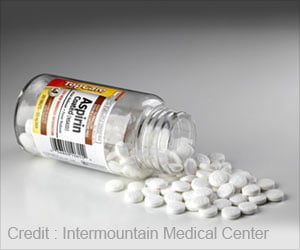An aspirin every day lowers the risk of death and hospitalization due to heart failure in patients with diabetes and heart failure.
- Taking an aspirin every day lowers the risk of death in patients suffering from both diabetes and heart failure.
- Patients taking one aspirin daily showed a 10 percent decrease in all-cause mortality and hospitalization for heart failure.
- However, aspirin also was found to increase the risk of non-fatal heart attack and stroke.
"Both heart failure and diabetes are associated with increased blood clotting activity," said Charbel Abi Khalil, MD, PhD, assistant professor of medicine at Weill Cornell Medicine-Qatar and the study's lead author. "Because it decreases platelet aggregation, aspirin is thought to lower the likelihood of forming harmful blood clots like those responsible for heart attacks and strokes."
While aspirin is recommended for patients with a previous history of heart attack or stroke, guidelines are unclear about its use in patients who have cardiovascular risk factors but no history of heart attack or stroke. This study is the first to assess aspirin as a preventative measure for patients with both heart failure and diabetes.
About 27 million people in the U.S. have type 2 diabetes and about 6.5 million adults in the country have heart failure, a condition in which the heart becomes too weak to pump enough blood to meet the body's needs. Each condition is associated with an elevated risk of cardiac events, including heart attack and stroke. This study sheds new light on the potential risks and benefits of aspirin for people with both conditions.
"We were surprised to see a paradoxical increase in nonfatal heart attacks and nonfatal stroke, parallel to the decrease in mortality," said Charbel Abi Khalil, MD, PhD, assistant professor of medicine at Weill Cornell Medicine-Qatar and the study's lead author. "This finding might be due to the fact that those patients lived longer; given their mean age of 70 years, perhaps these patients were predisposed to more cardiac events."
Study Overview
Health records of over 12,000 patients aged 55 and above were taken from a United Kingdom database known as The Health Improvement Network (THIN). All patients had type 2 diabetes and heart failure, but no prior history of heart attack, stroke, peripheral artery disease or atrial fibrillation. Nearly 50% had been prescribed daily aspirin and the other 50% were not given aspirin.Patients who took one aspirin a day were found to show:
- 10 percent decrease in the primary outcome
- No difference in major bleeding events
- 50 percent increase in nonfatal heart attack or stroke.
- Aspirin lowers risk of death for patients with diabetes, heart failure - (https://medicalxpress.com/news/2018-02-aspirin-lowers-death-patients-diabetes.html)
















